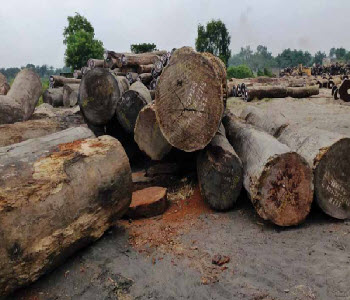A new study published in the Philosophical Transactions of the Royal Society states that deforestation has slowed as “controlled timber management” schemes have taken effect and agricultural expansion into forests has slowed. There is little evidence to back up such claims, while the study ignores threats from the expansion of illegal logging operations, large-scale agricultural investments and palm oil plantations.
“This is a shortsighted and misleading study. The world’s second largest rainforest is losing 2000 square km - an area 34 times the size of Manhattan - every year. This is totally unsustainable, and it’s set to get worse. When the Democratic Republic of Congo‘s freeze on new logging is lifted and the forest has been parcelled up for different commercial uses, we’ll see much more deforestation. The idea that things are moving in the right direction is ludicrous,” said Alexandra Pardal of Global Witness.
Likewise, the report’s claims that a downturn in the rate of deforestation can be attributed to better management of the region’s forests do not bear scrutiny.
“This study talks breathlessly about the effectiveness of sustainable timber management schemes, but where is the evidence? Independent reports corroborate Global Witness findings that illegality, corruption and over-exploitation are endemic to Congo Basin logging, and even the Democratic Republic of Congo’s own agricultural minister likened his country’s forest sector to “the Wild West” recently. The planet needs these forests to survive, so we should be looking for ways to protect them, not celebrating killing them off a little more slowly,” said Pardal.
In March, the EU passed legislation to stem the flow of illegally harvested timber into the region. Investigations by Global Witness found illegally felled logs from Liberia in ports in France shortly before the ban came in, underlining the need for companies to to carry out checks on their supply chain and avoid possible criminal penalties.
Related articles
- • Jean-Pierre Bemba named MLC presidential candidate (July 13, 2018)
- • Deforestation Slows in Congo Basin (July 22, 2013)
- • Widespread abuse of logging permits opens up Congo's forests to more destruction (October 25, 2012)
- • DR Congo, IMF to Co-Host Conference on the Management of Natural Resources (March 13, 2012)
- • African Rainforests Continue to Face Challenges (January 6, 2012)
- • UN advises prudent use of abundant resources to spur development (October 10, 2011)
- • Kabila Makes Re-Election Pitch in Speech to the Nation (September 15, 2011)
- • Global Witness welcomes DR Congo's decision to publish resource contracts (June 3, 2011)
- • Upcoming UN-backed summit to focus on sustainable management of rainforests (April 13, 2011)
- • DR Congo blocks oil search in Virunga National Park (March 18, 2011)
- • UN Report: CNDP, Congolese Soldiers Involved in Illegal Mining Operations (November 30, 2010)
- • 2010 Human Development Report analyses long-term development trends (November 4, 2010)
- • Government Launches Investigation into Latest Boat Accidents (September 6, 2010)
- • Congo Catholic Bishops Praise U.S. Law on 'Conflict Minerals' (August 3, 2010)
- • Equateur Province Governor Bans Exports of Unprocessed Timber (July 7, 2010)
- • UNEP, PUMA in joint strategic deal to support biodiversity worldwide (January 7, 2010)
- • DR Congo to host CEEAC summit on peace, integration, environment (October 23, 2009)
- • Clinton: US Committed to Good Governance in Congo (August 10, 2009)
- • Logging firms 'avoid Congo tax' (July 30, 2008)
- • Fueling World Ivory Trade Spells New Threat to Africa's Elephant Population (May 2, 2008)
- • Plan to Harness Congo River Could Double Electricity Production in Africa (April 21, 2008)
- • Africa plans biggest dam project (April 21, 2008)
- • Visit of UK representatives to Mbandaka (January 29, 2008)
- • Climate change in the DRC and future challenges (December 21, 2007)
- • Ten millionth tree planted in Congo's gorilla habitat (November 26, 2007)
- • Congo arrests after toxic dumping (November 10, 2007)
- • Likasi residents told to avoid radioactive river (November 9, 2007)
- • Radioactive Material Dumped Into Congolese River (November 9, 2007)
- • DRC Investigates Suspected Illegal Dumping of Radioactive Ore (November 7, 2007)
- • United States Support to the Democratic Republic of the Congo (October 31, 2007)
Tags: |








